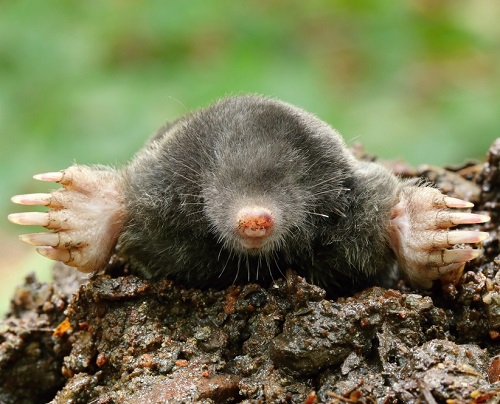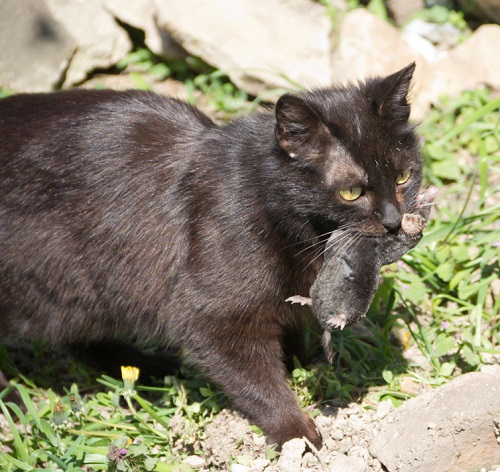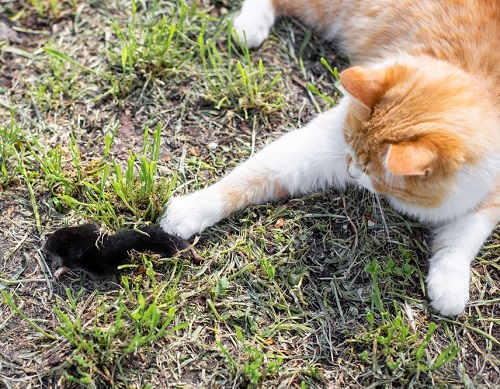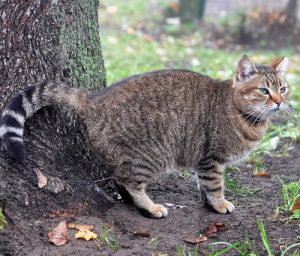Can Cats Eat Moles? The answer might surprise you! Read this short yet informative article to uncover the truth!
Moles are irresistible targets for feline hunters, but Can Cats Eat Moles? Let’s find out the answer and much more in this well-curated article.
Do Cats Kill Bugs? Find out here
What Are Moles?

Moles are small, burrowing mammals characterized by their cylindrical bodies, velvety fur, and strong forelimbs with claws specialized for digging. These remarkable creatures are adapted for life underground, where they create intricate tunnel systems as their homes. Moles feed primarily on earthworms, insects, and grubs, utilizing their acute sense of touch and hearing to locate prey.
Are Cats Natural Hunters?
Cats are natural hunters with a strong instinct for tracking and capturing prey. As descendants of wild feline species, domestic cats have retained their predatory abilities. They possess several physical and behavioral traits that make them highly efficient hunters. Cats have sharp claws, along with keen senses of sight, hearing, and smell, which aid in detecting and tracking potential targets. They are agile and stealthy, capable of stalking their prey silently before launching a swift and precise attack. Even well-fed domestic felines often exhibit hunting behavior, which serves as a way to express their natural instincts and engage in mental and physical stimulation.
Can Cats Eat Moles?

Yes, cats can eat moles. While domestic cats may not encounter moles frequently, if given the opportunity, they can hunt and consume them. The hunting instincts of kitties make them capable of catching small mammals like moles. It’s not uncommon for outdoor cats to bring home prey, including moles, as a display of their hunting prowess.
Is Eating Moles Harmful for Cats?
Eating moles is generally not harmful to cats, as the former is a natural prey for feline predators. However, there are a few considerations to keep in mind, which have been listed in the upcoming section. A major risk is that moles may carry parasites or infections that can be transmitted to the feline gut during consumption.
Can Moles Hurt Your Cat?
In general, moles are not a direct threat to cats and are unlikely to cause harm. They have small mouths and lack the physical adaptations for an aggressive defense. However, if a cat attempts to engage with a mole, there is a slight possibility of scratches or bites from the mole in self-defense. In such cases, minor injuries may occur, but they are typically superficial and not severe.
Do Cats Like Mole Meat?

Cats have individual preferences when it comes to their food choices, and it can depend on factors such as their upbringing, previous experiences, and personal taste preferences. Some cats may find the taste and texture of mole meat appealing due to its meaty nature and the instinctual drive to consume small prey. However, kitties should consume the meat of mole in moderation and not as the sole source of their nutrition.
Does Mole Meat Provide Any Health Benefits To Cats?
Following are the benefits that mole meat may provide to your cats:
- Amino acids: Mole meat, like other animal protein sources, can provide essential amino acids that are necessary for a cat’s overall health and well-being.
- Muscle growth: It can contribute to the maintenance and growth of lean muscle mass in cats, as protein is a crucial component of their diet.
- Essential vitamins and minerals: Mole meat may provide certain vitamins and minerals, such as vitamin B12, iron, and zinc, which are essential for various physiological functions in cats.
Risks Of Cats Eating Mole Meat
- Parasites: Moles carry parasites such as fleas, ticks, or internal parasites, which can be transmitted to cats through consumption.
- Toxins: Moles may come into contact with pesticides, rodenticides, or other toxic substances, and if a cat consumes an affected mole, it can be exposed to these harmful chemicals.
- Infections: Cats can get infections or diseases due to moles, as they carry harmful bacteria, like M. bovis. This risk is relatively low but still worth considering.
- Allergic Reactions: Some cats may develop allergies or sensitivities to certain proteins found in mole meat, leading to digestive upset, skin issues, or other allergic reactions.
- Imbalanced Diet: If a cat consumes mole meat without a balanced and complete diet, it may result in nutritional deficiencies, as mole meat alone may not provide all the necessary nutrients required by cats.
Can Cats Eat Moles? Quick Takeaways
- Moles are small mammals that feed on worms and other small insects.
- Cats can eat moles, as they are carnivores and have the ability to hunt and consume small mammals.
- It is very unlikely for a mole to overpower a cat because of the vast difference in their physical size.
- Mole meat can provide essential amino acids, contribute to muscle growth, and offer certain vitamins and minerals for cats.
- Parasites, toxins, infections, allergic reactions, and an imbalanced diet are some of the risks of consuming contaminated mole meat.



